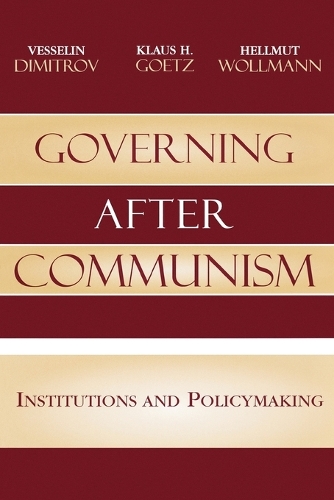
Governing after Communism: Institutions and Policymaking
(Paperback)
Publishing Details
Governing after Communism: Institutions and Policymaking
By (Author) Vesselin Dimitrov
By (author) Klaus H. Goetz
By (author) Hellmut Wollmann
Bloomsbury Publishing PLC
Rowman & Littlefield Publishers
27th April 2006
United States
Classifications
Tertiary Education
Non Fiction
320.943
Physical Properties
Paperback
310
Width 151mm, Height 235mm, Spine 17mm
399g
Description
This timely comparative analysis explores the evolution of governance in Central and Eastern Europe. The book considers post-communist leaders' key challenge: the development of central government institutions capable of coordinating, integrating, and steering the policymaking process. Building on a broad range of primary sources and extensive field research, the distinguished authors analyze the processes and outcomes of institution-building in Hungary, Poland, the Czech Republic, and Bulgaria since the late 1980s. They examine in detail the organization and inner workings of central executives; explain differences in executive trajectories across time and countries by considering the influence of institutional legacies, the impact of evolving party systems, and the role of crises in spurring institutional change; and show the effects of executive institutions on patterns of public policy, especially the budgetary process. Through a rigorous application of the core-executive framework, this study offers nuanced conceptual and analytical insights that will enhance understanding of both the evolving institutions of Central and Eastern Europe and the more stable West European systems. The in-depth analysis of the development of national executive institutions casts a distinctive new light on debates about EU enlargement, Europeanization, and patterns of governance.
Reviews
A landmark text in the study of the new post-communist political systems in post-Cold War Europe. It offers fresh and illuminating insights into how executives are configured and function in the fast-changing contexts of transition, modernization, and Europeanization. It is a major contribution to comparative politics and required reading for all who wish to understand an essential aspect of how the new Europe functions. -- Kenneth Dyson, Cardiff University, Wales
Recommended. * Choice Reviews *
Undoubtedly, this book is successful in the important task of clearing out the empirical terrain. In so doing, it raises a number of interesting questions about post-communist cabinets and institutions which authors are steadily engaged in addressing in their near future research. * Political Studies Review *
An impressive, scholarly, and timely piece of work that provides substantial insight and empirical research in an area of rapidly growing importance. -- Paul Lewis, Open University
Author Bio
Vesselin Dimitrov is senior lecturer in the Department of Government at the London School of Economics and Political Science. Klaus H. Goetz is chair of government, faculty of economics and social sciences, University of Potsdam, Germany; and visiting fellow, European Institute, London School of Economics and Political Science. Hellmut Wollmann is emeritus professor of public administration in the Institute of Social Sciences at Humboldt University, Berlin.
